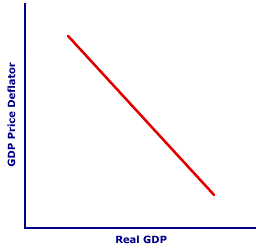
|
|
PAYROLL TAX: A tax levied on the wage earnings, or payroll, of workers. The most notable, if nothing else in terms of sheer dollar amount, is the Social Security tax.
Visit the GLOSS*arama
|
|


|

|
                           REAL-BALANCE EFFECT: A change in aggregate expenditures on real production made by the household, business, government, and foreign sectors that results because a change in the price level alters the purchasing power of money. This is one of three effects underlying the negative slope of the aggregate demand curve associated with a movement along the aggregate demand curve and a change in aggregate expenditures. The other two are interest-rate effect and net-export effect. The real-balance effect is somewhat analogous to the income effect underlying the negative slope of the market demand curve. The real-balance effect is one of three basic effects that indicate why aggregate expenditures are inversely related to the price level. The real-balance effect works like this: A higher price level decreases the purchasing power of money resulting in a decrease in consumption expenditures, investment expenditures, government purchases, and net exports. A lower price level has the opposite affect, causing an increase in the purchasing power of money which results in an increase in consumption expenditures, investment expenditures, government purchases, and net exports. | Along the Curve |  |
Before examining the details of the real-balanced effect, consider the specifics of what it does. A typical aggregate demand curve is presented in the exhibit to the right. The negative slope of the aggregate demand curve captures the inverse relation between the price level and aggregate expenditures on real production.When the price level changes, the real-balanced effect is activated, which is what then results in a change in aggregate expenditures and the movement long the aggregate demand curve. To illustrate this process, click the [Change Price Level] button. The real-balanced effect is based on the realistic presumption that the supply of money in circulation is constant at any given time. Money is what the four basic macroeconomic sectors use to purchase production. How much production they are able to purchase (that is, aggregate expenditures) depends on the amount of money in circulation relative to the prices of the goods and services produced (that is, the price level). When the price level changes, the purchasing power of the available money supply also changes and so too do aggregate expenditures. A higher price level means money can buy less production. A lower price level means money can buy more production. Suppose, for example, that Duncan Thurly's share of the nation's money supply is $10. At a price of $2 each, he can afford to purchase five Wacky Willy Stuffed Amigos (those cute and cuddly armadillos and scorpions). However, if the price level rises, and with it the price of Stuffed Amigos, then he can no longer afford to purchase five of these cuddly creatures. At $2.50 each, he can now afford to buy only four Stuffed Amigos. His share of aggregate expenditures on REAL production declines from five Stuffed Amigos to four. The purchasing power of his $10 of money has fallen and with it his aggregate expenditures on real production. He has succumbed to the real-balance effect. How in the world did economists come up with the phrase "real-balance" to indicate this effect? The "real" part refers to the "real" purchasing power of money. That is, how much real production can be purchased with the money. The "balance" part is included because money is often referred to as money "balances." This effect could be called the real-money effect just as easily.

Recommended Citation:REAL-BALANCE EFFECT, AmosWEB Encyclonomic WEB*pedia, http://www.AmosWEB.com, AmosWEB LLC, 2000-2024. [Accessed: October 30, 2024].
Check Out These Related Terms... | | | | | | |
Or For A Little Background... | | | | | | | | | | | | |
And For Further Study... | | | | | | | | | | |
Search Again?
Back to the WEB*pedia
|



|

|
BROWN PRAGMATOX
[What's This?]
Today, you are likely to spend a great deal of time flipping through mail order catalogs wanting to buy either a key chain with a built-in flashlight and panic button or a green and yellow striped sweater vest. Be on the lookout for bottles of barbeque sauce that act TOO innocent.
Your Complete Scope
This isn't me! What am I?
|

|
|
The word "fiscal" is derived from a Latin word meaning "moneybag."
|

|
|
"Anyone who has never made a mistake has never tried anything new. " -- Albert Einstein, physicist
|

|
R&D
Research and Development
|

|
|
Tell us what you think about AmosWEB. Like what you see? Have suggestions for improvements? Let us know. Click the User Feedback link.
User Feedback
|


|


